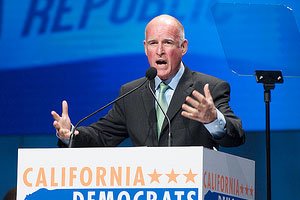Negotiations to let voters decide on whether to continue
temporary state tax extensions have come to a screeching halt at
the legislative level, a linchpin that could severely hurt the
Gilroy Unified School District.
Negotiations to let voters decide on whether to continue temporary state tax extensions have come to a screeching halt at the legislative level, a linchpin that could severely hurt the Gilroy Unified School District.
Without the revenue needed to maintain minimum state-guaranteed flat funding for schools, GUSD will have to slash another $3.9 million from its budget by means of increased class sizes and additional furlough days.
In light of Gov. Jerry Brown halting bipartisan state budget negotiations Tuesday, tacking on millions in cuts is a possibility – with more potentially on the horizon, according to GUSD officials.
“If the tax extensions are not placed on the ballot in June, GUSD will have to cut $6.7 million based on what is known at this moment,” confirmed GUSD Superintendent Debbie Flores in an email Wednesday. “However, fiscal analysts that advise school districts have already warned us that there could be a much worse scenario. The Governor and legislature have only dealt with about half of the deficit through cuts.”
If the remainder of the deficit also comes from cuts, she said, K-12 education “will likely be cut even further.”
For the past several months GUSD has been preparing for two possible fiscal situations.
If temporary tax extensions made it to the ballot in a special June election – and were passed – the district would have to cut $2.8 million from its budget.
For this scenario, GUSD has found a way to meet these cuts through strategies such as reductions in the home-to-school transportation program, reorganization and downsizing at the district office, reducing staffing of secondary school administrative positions, reducing the independent study program and implementing three furlough days.
If proposed temporary tax extensions aren’t passed, GUSD will have to cut $6.7 million from its budget.
The district’s plan to function under this circumstance, should it become reality, is still a work in progress.
So far tactics approved by GUSD trustees include class size increases of various ratios in kindergarten through the eighth grades. Trustees have also approved an additional five furlough days, bringing the total up to eight.
All of these cuts however, still leave the district $387,954 short of its $6.7 million target according to Kirsten Perez, director of fiscal services for GUSD.
Halted negotiations
The latter possibility has been dubbed “the worst-case” scenario and appears imminent as of Tuesday, when the office of Gov. Jerry Brown released an official statement confirming budget negotiations have come to a standstill.
“Yesterday, I stopped the discussions that I had been conducting with various members of the Republican Party regarding our state’s massive deficit,” said Brown in the statement.
For months Brown has been trying to get the state legislature to organize a special June election where voters would decide on a measure to extend two temporary tax increases and a fee for another five years, which are set to expire July 1, 2011.
For GUSD everything hinges on this additional revenue, which included the approval of a temporary five-year extension on a personal income tax increase, a sales tax increase and a hike in California’s vehicle license fee, which was adopted in 2009.
Without this revenue, flat funding from Proposition 98 – which was passed in 1998 and guarantees minimum state funding for schools – could drop from anywhere between $4 to $5 billion, according to Perez.
“If $5 billion was reduced from Proposition 98 funds, this would put education funding back to level it was funded in 1999-2000,” she said.
In Tuesday’s statement, Brown explained the budget he put forth is balanced between deep cuts and extensions of currently existing taxes.
“I believe it is in the best interest of California,” he said. “Under our constitution, however, two Republicans from the Assembly and two from the Senate must agree before this matter can be put to the people.”
Brown contends this route has been roadblocked by Republicans.
“Each and every Republican legislator I’ve spoken to believes that voters should not have this right to vote unless I agree to an ever-changing list of collateral demands,” he said.
Brown contends one of these deal-breaking demands includes Republicans requesting out-of-state corporations, which keeps “jobs out of California,” be given a billion dollar tax break that “will come from our schoolchildren, public safety and universities.”
Brown said this is not something he is not willing to agree to. On Tuesday evening, Brown released a YouTube message to voters, assuring there is more than one way to meet the state’s budget goal.
“I’m not giving up,” he said in the video. “Look, the problem has taken a decade to build up. It’s very serious and it’s going to take some time before we finally solve it. But I’m going to explore every possible avenue (we) have to protect our schools, public safety, public universities and the environment. I’ve been around a long time. I know we can do it.”
Scenario could get worse
In an email sent Thursday, Perez reiterated Flores’ concerns the $6.7 million gap could widen even further.
“Obviously the fact that budget negotiations in Sacramento have collapsed creates additional financial concerns for school districts,” she wrote. “Several recent articles by education financial experts have indicated that the “worst-case scenario” used by the majority of school districts could become even worse.”
During a school board meeting Thursday evening at 7810 Arroyo Circle, trustees discussed what further cuts may come in light of the “worst-case” scenario.
In Thursday’s email before the meeting, Perez explained one of these budget-cutting ideas would include the proposal to utilize $375,000 in funds from the Special Education American Recovery and Reinvestment Act. Perez said this would decrease the shortfall to $12,954 if the board approves the recommendation.
var docstoc_docid=”75144873″;var docstoc_title=”GUSD Proposals”;var docstoc_urltitle=”GUSD Proposals”;GUSD Proposals –














